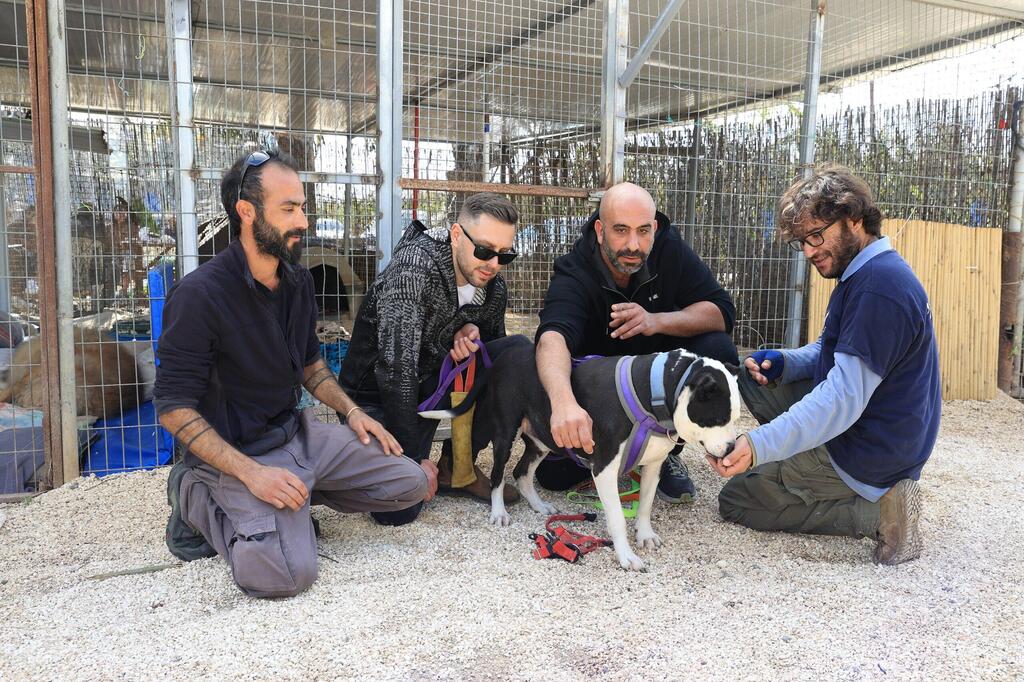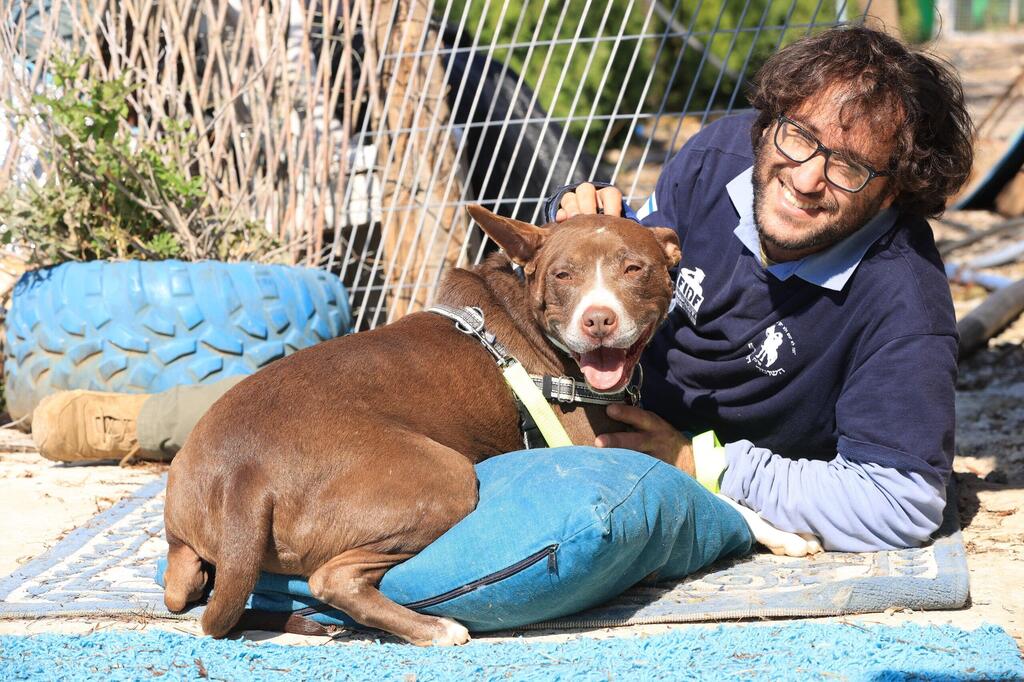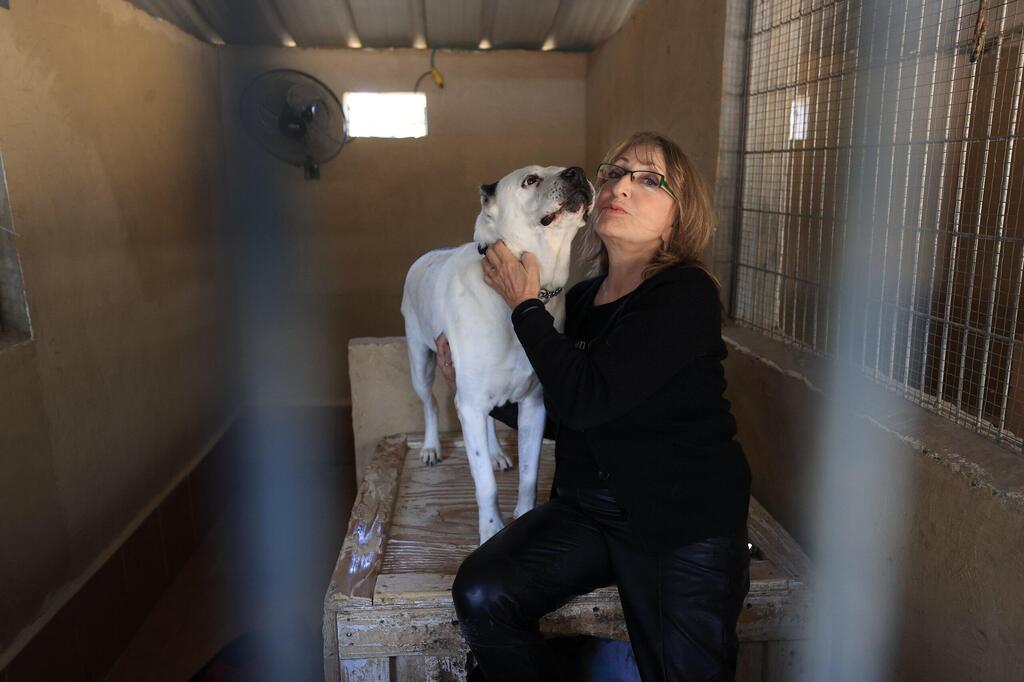In Megadim, a small moshav in northern Israel, there's a dog kennel with some very special residents. These dogs have been through horrors and came out on the other side, but not without cost. And just like soldiers, they too suffer from post-traumatic stress disorder.
Dobermans, Pitbulls and American Staffordshire Terriers (or Amstaff for short) have been subjected to harrowing experiences like dog fights, many coming out with substantial physical, as well as mental, scars.
The kennel is operated by the Gilboa Loves Animals foundation, established 17 years ago by Anya Moskov, and the dogs are paired with soldiers who also suffer from PTSD, in a project designed to give them the sort of companionship that understands their struggle without saying a word.
Kfir Eyal's first encounter with his dog Boss triggered flashbacks for the 42-year-old.
"It reminded me of the time I was committed to a psychiatric facility. I felt caged, like a dog waiting for his daily walk. I did no harm. I only tried to give, and instead, they locked me up. The first time I laid my eyes on Boss, I just knew he was the dog for me," he says.
Boss, however, needed a bit more time. The American Terrier came in damaged in more ways than one and needed several sessions before he began opening up and stopped going crazy around other dogs.
"I can see the improvement in both of us. I also adopted a dog following the project," he adds.
Eyal's PTSD began 10 years ago, after serving in the elite IDF Duvdevan unit for 19 years.
"For me, it comes across as violent outbursts and uncontrollable reactions to certain triggers. The recuperation involves a lengthy rehabilitation process and a lot of mental work."
What does that have to do with your military service?
"During training, they wipe out all the values you came in with and replace them with a new set of values, whereby you are fully prepared to walk into a crowded market and do everything required to stop a terrorist from detonating. These kinds of experiences have a mental toll."
Are you constantly alert?
"On duty, you have to be. It's very intense. You don't even think about it. It's embedded in you, so it also happens sometimes in civilian life. I began breaking stuff around the house. Sometimes it was the kids screaming that triggered me. When my wife tells me she wants to go clothes shopping, entering a store could trigger me. I can't go in there and I don't know how to tell her, so I erupt," Eyal says.
"I have a nightmare in which there's a terrorist in front of me and I pull out my gun but the bullet doesn't hit him, but me instead. Then I wake up. The memories are entrenched."
Patient becomes therapist
Anya Moskov became involved with dogs when her son brought a stray home.
"I brought him to an animal non-profit, followed by a few other dogs. Eventually, I decided to just start my own doggie foundation. These dog breeds I have are considered to be the most dangerous, but they're actually the best human companions," she says
And so the project was born. It is specifically tailored for combat-hardened soldiers and dogs and takes place in Megadim every Tuesday. Each soldier is paired with a dog, and they become each other's therapists.
Avi Misha, a professional dog trainer, says: "Dogs respond to quiet, confident leadership. Affirming inner and outer boundaries and releasing energy are mechanisms that help us cope."
The field of canine therapy has advanced by leaps and bounds in Israel.
"Canine therapy methods work with humans too. Trauma takes away control, and working with dogs helps regain it," Misha says.
When soldiers first arrive, they are taught about the history of canine therapy and dogs in general. Later on, they arrive at the kennel, pick a dog and start socializing with them one-on-one. In between, they chat over coffee with other soldiers about things only they would relate to, often using dark humor to get the point across.
"At first, the dogs were all over the place," says Misha. "Later, they began working with the soldiers and became in tune with them. For dogs that have experienced so much stress in their lives, it's a sight to behold."
Trainer Gabriel Friedman says: "To handle the dog's trauma, we first make it clear to him that he will never relive it here. We need to foster trust before training can start. Once you earn their trust, they're gonna lick your face all day long."
Yearning kindness
Anya Moskov says Pitbulls were originally bred as therapy dogs in 18th-century England.
"Genetically, they're not aggressive toward humans. There's a saying that if a thief barges into your home, a Pitbull would just show him love. Despite the fact they're not guard dogs, lots of non-profits won't accept them because people are scared to adopt them. The Pitbulls that arrive to us have been through hell and after all the fighting they've been through, they yearn for kindness and love," Moskov says.
"Pitbulls often practice on 'warmup dogs', after which they're thrown into the ring to fight for their lives while people stand around, gambling and cheering. The losers die and the winners are tossed aside. It's heartbreaking."
Moskov says that while the dog breeding industry is illegal in Israel, once the puppies are born, there is no law against selling them.
"People line up to buy them and regret it after nine months or so because the dog is too energetic. That's why so many dogs end up in dog shelters," she adds.
What is their condition when they get to you?
"Critical. They need plenty of physical and mental care. You can actually see how the dog is scared you're gonna hit him. We give them nothing but love, happiness and fun. They're exposed to people and begin changing. They're exactly like deserted children," she says
Kfir Eyal was so impressed with the project, it inspired him to adopt the dog he was working with.
"There is no way to actually cure PTSD. All the marijuana in the world won't make it go away. You surround yourself with those who are just like you, man or dog. You understand each other with no more than a glance."
How did this project change your life?
"No more violent outbursts. Some minor anxiety attacks but that's it."
What's your message to combat troops like yourself?
"There's nothing to be ashamed of and you did nothing wrong. I too was portrayed as a monster and here I am around people, feeling so much better."




